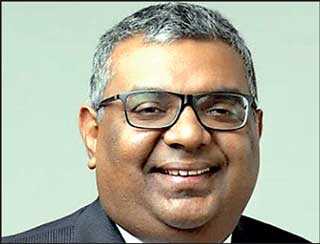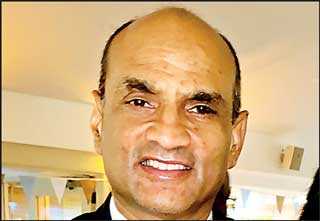Friday Feb 27, 2026
Friday Feb 27, 2026
Wednesday, 21 October 2020 00:00 - - {{hitsCtrl.values.hits}}
By Darshana Abayasingha
Over $ 150 billion worth of trade shifts will take place over the next four to five years, and if Sri Lanka could attract just 1% of that investment it could have a generational impact, said AmCham President
 |
| AmCham Sri Lanka President Presantha Jayamaha
|
 |
| USAID Mission Director Sri Lanka and The Maldives Reed Aeschliman
|
 |
| Export Development Board Chairman Prabhash Subasinghe
|
 |
| Deloitte LLC Stewart Pierce-Gardner
|
 |
| AmCHam Sri Lanka Hony. Secretary Shirendra Lawrence
|
Prasantha Jayamaha, at the launch of TRADESHIFTS 2020 in Colombo last week.
TRADESHIFTS is a series of events, discussions, policy and advocacy engagements focused on providing Sri Lankan businesses the opportunity to attract a portion of the shifting trade over the next four to five years. The program is presented by American Chamber of Commerce (AmCham) in Sri Lanka in collaboration with USAID, titled ‘Opportunities for Sri Lanka from Global Supply Chain Shifts’.
Speaking during the launch of the program for Colombo over webinar, Jayamaha added the COVID-19 pandemic amply demonstrated how a single country closing its borders disrupts global supply chains. Quoting Nissan executives, he added it only takes one missing part to stop an entire supply chain, which has rung true for large and even small-scale manufacturing operations the world over.
Taking into account such impacts, he added many US companies – similar to others – are diversifying supply and manufacturing operations, and countries like India, Bangladesh and Nepal have already reaped benefits due to the growing focus on South Asia, in additions to others like Vietnam and Malaysia.
“With these changes taking place, we anticipate over $ 150 billion in trade shifts over the next five years, and this is an opportunity for Sri Lanka to catch some of the investment coming into this region. There are five sectoral-level study groups in place for Sri Lanka to take a micro-level check and take this program to its next phase. This is an opportunity for all of us in the chambers, the private sector and the Government of Sri Lanka. We look forward to the Government taking the lead in this effort and providing necessary leadership,” Jayamaha said.
A USAID-funded project through its Partner Team has conducted an analysis and produced a report on a macro view of global supply chain shifts and opportunities for Sri Lanka. Produced together with Deloitte Consulting, it provides an informed view on likely future shifts in supply chain strategies across the short and medium-term, while identifying the implications for a country like Sri Lanka. The report was presented at the launch of TRADESHIFTS during the webinar.
USAID Mission Director in Sri Lanka Reed Aeschliman said his agency through the ‘Partner’ program is lending its fullest support to TRADESHIFTS 2020, noting the fast-changing landscape of global supply chains and their impact on economies. “Sri Lanka can benefit if it identifies and properly pursues the correct investment,” he added, pledging his support and action on the program.
Speaking during the forum, Export Development Board of Sri Lanka Chairman Prabhash Subasinghe said the Government and his agency welcomed such initiatives that benefit the country, noting that global supply chains had not fallen as badly as expected during COVID-19 despite being severely impacted.
“The time has come for Sri Lanka to take its share of trade shifts. We are an agile population with high-end knowledge and technical capacity, and we offer benefits such as GSP to the US. The potential for Sri Lanka to attract some of these investments is real,” Subasinghe said.
The EDB Chairman also noted that Sri Lanka must diversify its export basket and the private sector should take the lead in this aspect, as we have been living with an “outdated” basket of exports for a period of time. Sri Lanka’s export growth has been a mere 1% over the past decade he lamented, and there is a need to boost Foreign Direct Investments to enhance our export basket.
Delloitte’s Stuart Pierce made a presentation on the findings of the TRADESHIFST report, where he noted that whilst this program focusses on large multinationals as it deals on global supply chains. However, small and to medium scale supply chains and operations too could benefit from it, he pointed out. He remarked that global trade was making a recovery since the fallout from early this year, as demand weakened in affluent countries coupled with supply chain disruptions.
Pierce identified trade and tariff implications, rising supply chain costs in once-popular destinations and the speed of technology adoption as some of the reasons behind countries looking to diversify operations.